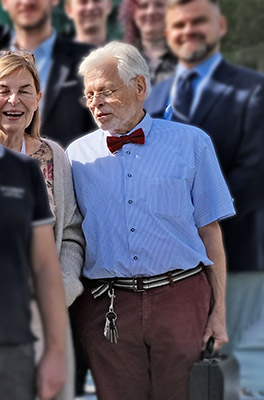Professor
Aleksander Sęk
- Email: aleksander.sek@amu.edu.pl
- Phone: +48 61 829 51 25
- ORCID: 0000-0003-4724-8639
- AMU Knowledge Base: publications
CONSULTATIONS
Monday, 10:00 – 11:30 in person, room 219, 2nd floor of the Department of Acoustics
Wednesday, 9:00 – 10:30

· Research Interests:
His primary research interests concern the functioning of the auditory system and sound perception. This topic has been developed in detail based on the perception of amplitude-modulated (AM) and frequency-modulated (FM) signals. One of the most recently pursued issues by him is the problem of speech intelligibility (in particular, the improvement of speech intelligibility) in individuals with sensorineural hearing loss. In recent years, his interests have also encompassed experimental methods in the field of psychophysiological acoustics.
Another central topic of his research has been the sensitivity of the auditory system to the so-called subtle temporal structure of stimuli, i.e., the sensitivity to momentary changes in acoustic pressure. The commonly accepted limit of pitch perception is close to 4 kHz, due to the ability to perceive the so-called “musical pitch.” For frequencies below 4 kHz, the perception of “pure” musical intervals (e.g., octaves) closely follows mathematical rules (f÷2f). However, above 4 kHz this strict relationship no longer holds. For example, the fundamental frequency of the highest note of the piccolo flute barely reaches 4 kHz. Therefore, his research also focused on the discrimination of frequencies above 4 kHz, which is directly related to the ability to localize high-frequency sounds.
In recent years, his scientific activity has been devoted to preparing, in fact writing from scratch, a suite of programs that are used to conduct various experiments related to the psychophysics of hearing. This suite, called PSYCHOACOUSTICS, was developed in collaboration with Prof. B.C.J. Moore. It enables a wide range of psychoacoustic studies from basic to very advanced, related, among other things, to our latest work. In addition to fundamental issues in the psychophysics of hearing, such as pitch and loudness discrimination, analysis of frequency selectivity, and interaural differences in phase and intensity, this suite also allows for the analysis of the so-called temporal fine structure and frequency selectivity based on a rapid method for determining psychophysical tuning curves. This set of programs is complemented by a comprehensive guide titled Guide to Psychoacoustics, published in 2-21, and forms the basis of the operation of the hearing psychophysics laboratory in our Institute, which we organized with Prof. A. Wichrem with the support of the Director of IA.
He has received awards: multiple Rector’s Awards of UAM for Scientific Achievements.
In order to enhance his teaching competencies, he has participated in many training courses, including, among others, …
He has led or been the executor in several research projects funded by NCN funds or others.
2007-2011 Collaborative Research Grant founded by Deafness Research UK with Professor Brian C.J. Moore, Department of Experimental Psychology, Cambridge University
2003-2006 Head of the project of the Polish State Committee for Scientific Research (p.no.4 T11E 01425),
2003-2005 Collaborative Research Initiative Grant with Professor Brian C.J. Moore from the Department of Experimental Psychology, Cambridge University,
2002-2003 Visiting Professor at the Research Institute of Electrical Communication, Tohoku University (Sendai, Japan),
1999-2002 Collaborative Research Initiative Grant with Professor Brian C.J. Moore from the Department of Experimental Psychology, Cambridge University,
1999-2002 Head of the project of the Polish State Committee for Scientific Research (p.no.T 07B 05216),
1995-1998 The Wellcome Trust Research Fellowship, Department of Experimental Psychology, Cambridge University.
1993-1994 The Wellcome Trust one-year Wellcome Travelling Research Fellowship, Department of Experimental Psychology, Cambridge University.
1992-1993 Royal Society one-year postdoctoral scholarship, Department of Experimental Psychology, Cambridge University.
1991-1993 Post-doctoral scholarship of the Polish Ministry of National Education.
1991 Cambridge Hospitality Scheme, Visiting Scholar, Department of Experimental Psychology, Cambridge University; Visiting Scholar, Sidney Sussex College, Cambridge.
1990-1992 Head of a project of the Polish State Committee for Scientific Research (p.no.2 0910 91 01)
1995-1998 The Wellcome Trust Research Fellowship, Department of Experimental Psychology, Cambridge University.
VI Framework Program HEARCOM, project FP6-IST-2, contract 004171 (as executor)
Analysis of phase synchronization phenomena in the auditory system for frequencies above 5 kHz. Grant number N N518 502139NCN (as leader)
Honorary Doctorate
He was the main organizer and co-organizer of many events, the most important of which was the organization and preparation of the ceremonies related to awarding an Honorary Doctorate to Professor Brian C. Moore from the University of Cambridge.
· Teaching Activities:
He teaches a range of courses: Psychoacoustics I and II, Signal Analysis, Speech Acoustics, Master’s Seminar, Master’s Laboratory

